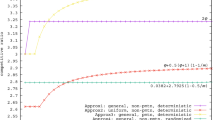Abstract
Multiprocessor scheduling, also called scheduling on parallel identical machines to minimize the makespan, is a classic optimization problem which has been extensively studied. Scheduling with testing is an online variant, where the processing time of a job is revealed by an extra test operation, otherwise the job has to be executed for a given upper bound on the processing time. Albers and Eckl recently studied the multiprocessor scheduling with testing; among others, for the non-preemptive setting they presented an approximation algorithm with competitive ratio approaching 3.1016 when the number of machines tends to infinity and an improved approximation algorithm with competitive ratio approaching 3 when all test operations take one unit of time each. We propose to first sort the jobs into non-increasing order of the minimum value between the upper bound and the testing time, then partition the jobs into three groups and process them group by group according to the sorted job order. We show that our algorithm achieves better competitive ratios, which approach 2.9513 when the number of machines tends to infinity in the general case; when all test operations each takes one time unit, our algorithm achieves even better competitive ratios approaching 2.8081.
Similar content being viewed by others
Data Availability
Not applicable
Notes
In fact, the authors of Albers and Eckl (2021) also examined the more restricted test-preemptive variant in which a job can be tested non-preemptively on one machine to obtain its accurate processing time, and then processed non-preemptively on any other machine starting at any later time. Their 2-competitive algorithm with access to unlimited computational power, or polynomial-time \((2 + \epsilon )\)-competitive algorithm for any \(\epsilon > 0\), is designed for such a variant.
We remark that the function \(T^g_m\) as defined in Eq. (1) is explicitly designed to satisfy this equality.
We remark that the function \(T^g_2\) as defined in Eq. (1) is explicitly designed to satisfy this equality.
We remark that the function \(T^u_m\) as defined in Eq. (2) is explicitly designed to satisfy this equality.
We remark that the function \(T^u_2\) as defined in Eq. (2) is explicitly designed to satisfy this equality.
References
Albers S (2002) On randomized online scheduling. Proc ACM STOC 2002:134–143
Albers S, Eckl A (2020) Explorable uncertainty in scheduling with non-uniform testing times. WAOA 2020:127–142
Albers S, Eckl A (2021) Scheduling with testing on multiple identical parallel machines. WADS 2021:29–42
Cai SY (2002) Semi online scheduling on three identical machines. J Wenzhou Teachers College 23:1–3 (In Chinese)
Chen B, Vliet A, Woeginger G (1994) New lower and upper bounds for on-line scheduling. Oper Res Lett 16:221–230
Dürr C, Erlebach T, Megow N, and Meißner J (2018) Scheduling with explorable uncertainty. ITCS 2018, LIPIcs 94, pages 30:1–30:14,
Dürr C, Erlebach T, Megow N, Meißner J (2020) An adversarial model for scheduling with testing. Algorithmica 82:3630–3675
Faigle U, Kern W, Turan G (1989) On the performance of on-line algorithms for partition problems. Acta Cybernet 9:107–119
Fleischer R, Wahl M (2000) On-line scheduling revisited. J Sched 3:343–353
Graham RL (1966) Bounds for certain multiprocessing anomalies. Bell Labs Tech J 45:1563–1581
He Y, Zhang G (1999) Semi online scheduling on two identical machines. Computing 62:179–187
Lee K, Lim K (2003) Semi-online scheduling problems on a small number of machines. J Sched 16:461–477
Rudin JF III (2001) Improved bounds for the on-line scheduling problem. PhD thesis
Rudin JF III, Chandrasekaran R (2003) Improved bound for the online scheduling problem. SIAM J Comput 32:717–735
Tan Z, Li R (2015) Pseudo lower bounds for online parallel machine scheduling. Oper Res Lett 43:489–494
Wu Y, Huang Y, Yang QF (2008) Semi-online multiprocessor scheduling with the longest given processing time. J Zhejiang Univ: Sci Ed 35:23–26 (In Chinese)
Acknowledgements
The authors are grateful to the reviewers for their many helpful comments and suggestions. RG and GL are supported by the NSERC Canada. EM is supported by the KAKENHI Grants JP21K11755 and JP17K00016 and the JST CREST JPMJR1402.
Author information
Authors and Affiliations
Corresponding author
Ethics declarations
Conflict of interest
The authors declare that they have no known competing financial interests or personal relationships that could have appeared to influence the work reported in this paper.
Additional information
Publisher's Note
Springer Nature remains neutral with regard to jurisdictional claims in published maps and institutional affiliations.
Rights and permissions
About this article
Cite this article
Gong, M., Goebel, R., Lin, G. et al. Improved approximation algorithms for non-preemptive multiprocessor scheduling with testing. J Comb Optim 44, 877–893 (2022). https://doi.org/10.1007/s10878-022-00865-y
Accepted:
Published:
Issue Date:
DOI: https://doi.org/10.1007/s10878-022-00865-y




